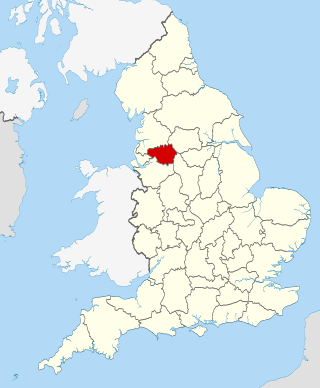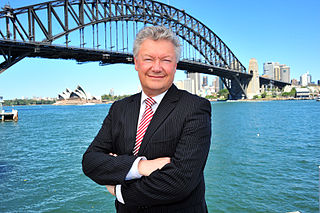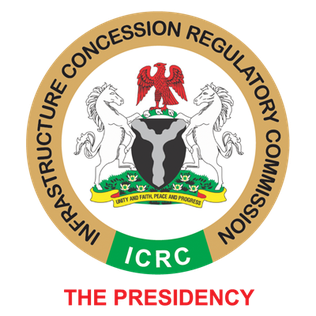Related Research Articles

A public utility company is an organization that maintains the infrastructure for a public service. Public utilities are subject to forms of public control and regulation ranging from local community-based groups to statewide government monopolies.

Infrastructure is the set of facilities and systems that serve a country, city, or other area, and encompasses the services and facilities necessary for its economy, households and firms to function. Infrastructure is composed of public and private physical structures such as roads, railways, bridges, tunnels, water supply, sewers, electrical grids, and telecommunications. In general, infrastructure has been defined as "the physical components of interrelated systems providing commodities and services essential to enable, sustain, or enhance societal living conditions" and maintain the surrounding environment.
The private finance initiative (PFI) was a United Kingdom government procurement policy aimed at creating "public–private partnerships" (PPPs) where private firms are contracted to complete and manage public projects. Initially launched in 1992 by Prime Minister John Major, and expanded considerably by the Blair government, PFI is part of the wider programme of privatisation and financialisation, and presented as a means for increasing accountability and efficiency for public spending.

A public–private partnership is a long-term arrangement between a government and private sector institutions. Typically, it involves private capital financing government projects and services up-front, and then drawing revenues from taxpayers and/or users for profit over the course of the PPP contract. Public–private partnerships have been implemented in multiple countries and are primarily used for infrastructure projects. Although they are not compulsory, PPPs have been employed for building, equipping, operating and maintaining schools, hospitals, transport systems, and water and sewerage systems.
Build–operate–transfer (BOT) or build–own–operate–transfer (BOOT) is a form of project delivery method, usually for large-scale infrastructure projects, wherein a private entity receives a concession from the public sector to finance, design, construct, own, and operate a facility stated in the concession contract. The private entity will have the right to operate it for a set period of time. This enables the project proponent to recover its investment and operating and maintenance expenses in the project.

The Greater Manchester Waste Disposal Authority (GMWDA) was England's largest waste disposal authority, responsible for the management and disposal of municipal waste from Greater Manchester. It dealt with 1.1 million tonnes of waste produced each year, from approximately 1 million households and a population of over 2.27 million in the metropolitan districts of Bolton, Bury, Manchester, Oldham, Rochdale, Salford, Stockport, Tameside and Trafford — though part of Greater Manchester, the Metropolitan Borough of Wigan administers its own waste disposal operations, however they were represented on the authority for administration purposes. The waste came primarily from household waste collections and 20 household waste recycling centres (HWRCs) provided and serviced by the GMWDA. It handled around 4% of the nation's municipal waste.

Jawaharlal Nehru National Urban Renewal Mission (JNNURM) was a massive city-modernization scheme launched by the Government of India under the Ministry of Urban Development. It envisaged a total investment of over $20 billion over seven years. It is named after Pt. Jawaharlal Nehru, the first Prime Minister of India. The aim is to encourage reforms and fast track planned development of identified cities. Focus is to be on efficiency in urban infrastructure and service delivery mechanisms, community participation, and accountability of ULBs/ Parastatal agencies towards citizens.

The Development Bank of Southern Africa (DBSA) is a development finance institution wholly owned by the Government of South Africa. The bank intends to "accelerate sustainable socio-economic development in the Southern African Development Community (SADC) by driving financial and non-financial investments in the social and economic infrastructure sectors".

The Renewable Energy and Energy Efficiency Partnership (REEEP) is a Vienna-based Quasi-International Organisation that advances markets for renewable energy and energy efficiency with a particular emphasis on the emerging markets and developing countries.
Energy Saving Trust is a British organization devoted to promoting energy efficiency, energy conservation, and the sustainable use of energy, thereby reducing carbon dioxide emissions and helping to prevent man-made climate change. It was founded in the United Kingdom as a government-sponsored initiative in 1992, following the global Earth Summit.
The Office of Energy Efficiency and Renewable Energy (EERE) is an office within the United States Department of Energy. Formed from other energy agencies after the 1973 energy crisis, EERE is led by the Assistant Secretary of Energy Efficiency and Renewable Energy, who is appointed by the president of the United States and confirmed by the U.S. Senate. Alejandro Moreno currently leads the office as the Acting Assistant Secretary.

Mouchel Group, originally known as L. G. Mouchel & Partners Ltd, was an infrastructure and business services company headquartered in Woking, United Kingdom. It provided advisory, design, project delivery and managed services associated with infrastructure and business services across the highways and transportation, local government, emergency services, property, health, education and utility markets across the world.

Allan Jones MBE, is an engineer who pioneered Combined Heat and Power (CHP), renewable energy and fuel cell systems in the United Kingdom and Australia from 1990 to the present.
Iona Capital Ltd is a fund management institution that specializes in the management of equity and debt investments for private and institutional clients. Its investment strategy focuses on seeking out promising start-up companies that align with the UK Government's goal of reducing waste sent to landfills. In addition to its environmental objectives, the company also places a significant emphasis on identifying and partnering with strong management teams.
Sustainable Energy Utility (SEU) is a community-based model of development founded on energy conservation and the use of renewables, seeking to permanently decrease the use of source materials, water, and energy. The model prescribes the creation of independent and financially self-sufficient non-profit entities for energy sustainability through conservation, efficiency, and end-user based decentralized renewable energy in an effort to address concerns about climate change, rising energy prices, inequity of energy availability, and a lack of community governance of energy development. The SEU model was developed by Dr. J. Byrne at the Center for Energy and Environmental Policy, University of Delaware. The Foundation for Renewable Energy and Environment (FREE) is implementing versions of the model.
Timothy John Stone, CBE is a British businessman and senior expert adviser with interests in infrastructure, finance, nuclear power and water supply. He is a non-executive director of the Arup Group, chairman of Nuclear Risk Insurers and former non-executive director of Horizon Nuclear Power and a former senior expert non-executive director on the board of the European Investment Bank. He was also a non-executive director of Anglian Water from 2011 to 2015. He was appointed Chair of the UK's Nuclear Industry Association in October 2018.

A green bank is a financial institution, typically public or quasi-public, that employs innovative financing techniques and market development tools in collaboration with the private sector to expedite the deployment of clean energy technologies. Green banks use public funds to leverage private investment in clean energy technologies that, despite their commercial viability, have struggled to establish a widespread presence in consumer markets. Green banks aim to reduce energy costs for ratepayers, stimulate private sector investment and economic activity, and expedite the transition to a low-carbon economy.

The Infrastructure Concession Regulatory Commission (ICRC) is an agency of the Federal Government of Nigeria responsible for the development and implementation of the Public-Private Partnership (PPP) framework for the provision of infrastructure services.
References
- ↑ "Local Partnerships". localpartnerships.gov.uk. Local Partnerships. Retrieved 19 March 2024.
- ↑ "Our expertise - Local Partnerships". 15 May 2023. Retrieved 19 March 2024.
- ↑ "Switch2 will accelerate heat network development via Re:fit framework". BDaily. 12 June 2020.
- ↑ "Managing PFI assets and services as contracts end" (PDF). National Audit Office. 5 June 2020.